unit1-5知识点
人教版九年级英语知识点归纳Unit1-5

九年级全一册Unit 1 How can we become good learners? 重点短语和固定搭配Section Awork with sb. 和...合作/一起工作listen to tapes 听磁带ask sb. for help 向某人寻求帮助study for a test 备考study by doing sth. 通过...方法学习have a conversation with sb. 和某人谈话read aloud 大声朗读practice pronunciation 练习发音learn a lot 学到很多speaking skills 口语表达能力spoken English 英语口语finish doing sth. 结束做某事give a report 作报告have a report 听报告at first 一开始first of all 首先,第一be patient 耐心be patient with sb. 对某人有耐心be patient of sth. 忍耐某事the secret to ...的秘诀learn to do sth. 学习做某事so ... that 太...以至于...most of the time 大部分时间be afraid of sth. 害怕某物be afraid to do 因害怕而不敢做because of sth. 由于;因为poor pronunciation 糟糕的发音watch a moviewatch an English moviefall in love with 强调动作性be in love with 强调状态性begin to do = begin doing 开始做某事at the beginning of 在...的开始body language 肢体语言help sb. do sth. = help sb. to do sth.= help sb. with sth. 帮助某人做某事as well 也a piece of cake 小菜一碟It serves you right. 你活该want sth. 想要某物want to do sth. 想要做某事want sb. to do sth. 想要某人做某事look up sth. in a dictionary 查字典have a better understanding of对...有更好的理解the meaning of ...的意思repeat out aloud 大声重复take notes 做笔记do exercises 做练习read a newspaper/ read newspaperskeep a diary in English 用英语写日记Section Bmake mistakes/ make a mistake 犯错误increase to 1,000 增加到increase by 10% 增加了at a speed of = at the speed of 以... 的速度be born with 天生具有the ability to do ......的能力depend on 取决于;若接动词,用V-ing learning habits 学习习惯have ... in common 有共同点be interested in sth./ doing sth. 对...感兴趣pay attention to 注意;若接动词,用V-ing connect ... with 把...与... 联系起来be connected with sth. 与...相连get bored 变得无聊be good at 在...方面做得好;擅长于be good for 对...有好处be good to 对...友善Practice makes perfect. 熟能生巧。
八年级上册 Unit 1-5 重点词组
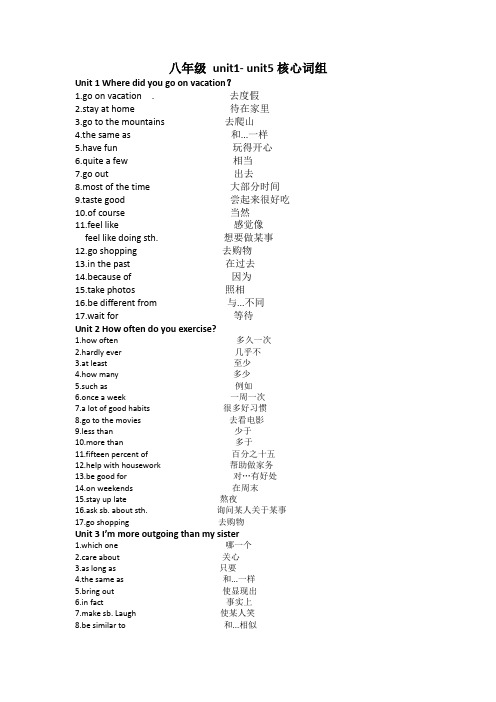
八年级unit1- unit5核心词组Unit 1 Where did you go on vacation?1.go on vacation . 去度假2.stay at home 待在家里3.go to the mountains 去爬山4.the same as 和...一样5.have fun 玩得开心6.quite a few 相当7.go out 出去8.most of the time 大部分时间9.taste good 尝起来很好吃10.of course 当然11.feel like 感觉像feel like doing sth. 想要做某事12.go shopping 去购物13.in the past 在过去14.because of 因为15.take photos 照相16.be different from 与...不同17.wait for 等待Unit 2 How often do you exercise?1.how often 多久一次2.hardly ever 几乎不3.at least 至少4.how many 多少5.such as 例如6.once a week 一周一次7.a lot of good habits 很多好习惯8.go to the movies 去看电影9.less than 少于10.more than 多于11.fifteen percent of 百分之十五12.help with housework 帮助做家务13.be good for 对…有好处14.on weekends 在周末15.stay up late 熬夜16.ask sb. about sth. 询问某人关于某事17.go shopping 去购物Unit 3 I’m more outgoing than my sister1.which one 哪一个2.care about 关心3.as long as 只要4.the same as 和...一样5.bring out 使显现出6.in fact 事实上7.make sb. Laugh 使某人笑8.be similar to 和...相似9. have fun 玩得开心Unit 4 What’s the best movie theater?1.have...in common 有共同特征2.be up to 由…决定3.play a role 由…决定4.make up 编造e true实现6.no problem 没问题7.take ...seriously 严肃对待8.for example 例如9.so far 到目前为止10.all kinds of 各种各样的11.be close to 靠近12.have fun doing sth. 玩得开心Unit 5 Do you want to watch a game show?1. let sb. do sth. 让某人做2. look like 看起来像3.have a discussion about 有一个关于...的讨论4.dress up 打扮,乔装5.one of the main reasons 主要原因之一6.do a good job 干得好7.try one’s best to do sth 尽某人最大地的努力做某事8.plan to do sth. 计划做某事9.happen to do sth. 碰巧做某事10.hope to do sth. 希望做某事11.be ready to do 准备好做某事12.expect to do sth. 期待做某事13.How about doing…? 做...怎么样拓展:=what about doing...?14.find out 查明白拓展:find out truth,time15.such as 例如拓展=for example16.take sb’s place 代替。
九年级上册英语unit1-unit5重点短语和句型

Unit 1 How can we become good learners? 【一】重点短语1. good learners 优秀的学习者 2. work with friends 和朋友一起学习3. study for a test 备考4.have conversations with 与……交与……交谈5.speaking skills 口语技巧6.a little 有点儿7.at first 起初起先8.the secret to... .......的秘诀9.because of 因为10.as well 也11.look up 查阅;抬头看12.so that 以便,为了13.the meaning of …………的意思14.make mistakes 犯错误15.talk to 交谈16.depend on 依靠依赖17.in common 共有的18.pay attention to 注意关注19. connect …with …把……联系20.for example 例如21.think about 考虑22.even if 即使尽管纵容23.look for 寻找24.worry about 担心担忧25.make word cards 制作单词卡片26.ask the teacher for help 向老师求助27.read aloud 大声读28.spoken English 英语口语29.give a report 作报告30.word by word 一字一字地31. so……that 如此……以至于32.fall in love with 爱上33.something interesting 有趣的事情34.take notes 记笔记35.how often 多久一次36.a lot of 许多37.the ability to do sth. 做某事的能力38.learning habits 学习习惯39.be interested in 对……感兴趣40.get bored 感到无聊【二】重点句型1.提建议的句子:①What/ how about +doing sth.? 做…怎么样?如:What/ How about going shopping? ②Why don't you + do sth.? 你为什么不做…?如:Why don't you go shopping? ③Why not + do sth. ? 为什么不做…?如:Why not go shopping? ④Let's + do sth. 让我们做…吧。
七年级上册英语1-5单元知识点

七年级上册英语1-5单元知识点一、单元一:My new school1. 介绍新学校的地理位置新学校位于市中心,交通便利,附近有商店、餐馆等设施。
2. 学校设施介绍学校设施齐全,包括教室、图书馆、实验室、体育馆等。
3. 自我介绍这个单元主要学习如何介绍自己,包括尊称、芳龄、爱好等。
二、单元二:My family1. 家庭成员介绍学习如何介绍家庭成员,包括父母、兄弟姐妹等。
2. 家庭活动介绍了解家庭成员之间常做的活动,如一起看电视、一起运动等。
3. 家庭照片描述学习如何描述家庭照片中的人和场景。
三、单元三:My weekend1. 周末活动介绍学习如何介绍自己在周末通常做些什么,如参加体育活动、去购物等。
2. 用一般现在时描述周末活动学习如何用一般现在时描述周末常做的活动。
3. 周末计划介绍学习如何描述自己周末的计划,可以是去哪里玩或者做什么事情。
四、单元四:At the weekend1. 对周末活动的提问和回答学习如何用简单的英语询问他人周末通常做些什么,并且回答。
2. 一般过去时的用法了解一般过去时的用法,描述过去周末做的事情。
3. 回顾性描述周末活动学习如何用英语描述上个周末发生的事情。
五、单元五:Can you swim?1. 询问他人的能力学习如何用英语问别人是否会游泳、跳舞等。
2. 肯定回答询问了解如何肯定地回答别人的能力询问。
3. 否定回答询问学习如何否定地回答别人的能力询问。
以上是七年级上册英语1-5单元的知识点总结,希朥对大家有所帮助。
在七年级英语上册的1-5单元中,学生们接触到了许多日常生活中常用的英语表达和语法知识。
接下来,我们将进一步续写和扩展这些知识点,为大家详细解析每个单元的重点内容。
一、单元一:My new school在介绍新学校地理位置的基础上,学生们还可以学习如何描述学校的周边环境和特点,例如周围的建筑、绿化情况等。
学生也将学会用英语描述学校设施的具体情况,比如教室里有什么设备,图书馆的藏书数量,实验室的实验器材等。
九年级上册英语1到5单元知识点

九年级上册英语1到5单元知识点总结1. Unit 1: Best friends- Vocabulary: friendship,panion, trust, support- Grammar: present continuous tense, possessive pronouns - Topic: The importance of friendship and how to be a good friend2. Unit 2: English around the world- Vocabulary: bilingual, dialect, accent, globalization- Grammar:parative and superlative adjectives, adverbs of frequency- Topic: The influence of English as a global language and its variations in different countries3. Unit 3: Travel journal- Vocabulary: destination, itinerary, amodation, excursion- Grammar: past simple tense, past continuous tense- Topic: Sharing travel experiences, discussing favorite destinations, and describing past trips4. Unit 4: Great inventions- Vocabulary: innovation, breakthrough, patent, prototype- Grammar: reported speech, passive voice- Topic: Exploring the impact of inventions on society and discussing the process of innovation5. Unit 5: Health and well-being- Vocabulary: nutrition, fitness, well-being, hygiene- Grammar: modal verbs, conditional sentences- Topic: Promoting a healthy lifestyle, discussing the importance of exercise and balanced dietBased on the above knowledge points, it is clear that the ninth-grade English curriculum covers a wide range of topics from interpersonal relationships to globalmunication, from personal experiences to technological advancements, and from physical health to overall well-being. As a language, English not only serves as a means ofmunication but also provides insights into various aspects of life and society.In Unit 1, the focus on friendship highlights the importance of building and maintaining meaningful relationships. The vocabulary related to friendship emphasizes qualities such as trust and support, while the grammar lessons on present continuous tense and possessive pronouns enable students toexpress their thoughts and emotions more accurately. By incorporating these language elements into discussions about friendship, students are able to deepen their understanding of the topic and express themselves more fluently.Moving on to Unit 2, the exploration of English as a global language introduces students to the diversity of language and culture. The vocabulary related to bilingualism and globalization sheds light on the influence of English in different contexts, while the grammar lessons onparative and superlative adjectives provide a framework forparing and contrasting languages. Through discussions on language variations and the impact of globalization, students gain insights into the interconnectedness of the world and the importance of cultural exchange.In Unit 3, the travel journal serves as a platform for students to share their experiences and broaden their perspectives. The vocabulary related to travel and the grammar lessons on past tenses enable students to narrate their past experiences and plan future trips. By engaging in discussions about favorite destinations and travel itineraries, students not only enhance their language skills but also develop a sense of curiosity andadventure.Unit 4 delves into the realm of innovation and invention, offering students a glimpse into the world of creativity and problem-solving. The vocabulary related to innovation and the grammar lessons on reported speech and passive voice provide students with the tools to discuss technological advancements and their impact on society. Through debates on the pros and cons of various inventions, students develop critical thinking skills and an appreciation for human ingenuity.Finally, in Unit 5, the focus on health and well-being encourages students to reflect on their lifestyle choices and habits. The vocabulary related to nutrition and fitness,bined with the grammar lessons on modal verbs and conditional sentences, empowers students to advocate for a healthy lifestyle and express their concerns about public health issues. By engaging in conversations about the importance of exercise and balanced diet, students not only improve their language proficiency but also cultivate a sense of responsibility towards themselves and others.In conclusion, the ninth-grade English curriculum offers a richtapestry of topics that not only enhance language skills but also foster personal growth and broadened perspectives. By incorporating vocabulary, grammar, and topics that are relevant to students' lives, the curriculum provides an engaging and meaningful learning experience.As a writer, I personally find the integration of language learning with real-life topics to be highly effective in stimulating students' interest and fostering a holistic understanding of the English language. Furthermore, the emphasis onmunication skills and critical thinking in the curriculum equips students with the tools to navigate a rapidly changing world, both linguistically and intellectually.In summary, the ninth-grade English curriculum, with its diverse range of topics and language elements, not only prepares students for linguistic proficiency but also nurtures their intellectual curiosity and global awareness. Through the exploration of friendship, globalmunication, travel experiences, technological advancements, and health consciousness, students are not only equipped with language skills but also empowered to navigate theplexities of the modern world. This holistic approach to language learning is essential in nurturingwell-rounded individuals who are capable of engaging with the world in a meaningful and impactful manner.。
人教版小学五年级上册英语知识点【1-6单元】
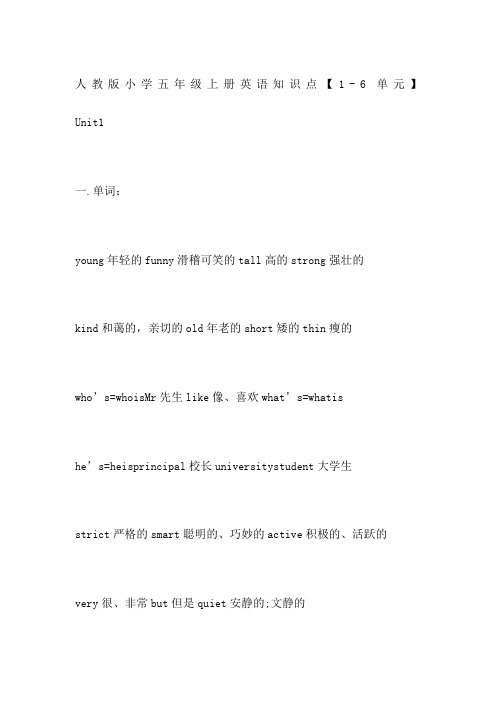
人教版小学五年级上册英语知识点【1-6单元】Unit1一.单词:young年轻的funny滑稽可笑的tall高的strong强壮的kind和蔼的,亲切的old年老的short矮的thin瘦的who’s=whoisMr先生like像、喜欢what’s=whatishe’s=heisprincipal校长universitystudent大学生strict严格的smart聪明的、巧妙的active积极的、活跃的very很、非常but但是quiet安静的;文静的she’s=sheis二.句子:1.A:Who’syourEnglishteacher你的英语老师是谁B:MrCarter.卡特先生.2.He’sfromCanada.他来自加拿大。
3.A:What’shelike他什么样B:He’stallandstrong.他又高又壮。
He’sveryfunny.他很滑稽。
(Who,What引导的特殊疑问句,用来对不熟悉的老师进行问答:Who's+某人What'she/shelikeHe/Sheis+与身体特征和性格特征有关的形容词。
)4.A:W ho’sthatyounglady/那个年轻的女士是谁B:She’sourprincipal.她是我们的校长。
5.Ihaveanewmathteacher.我有一位新数学老师。
6.Herclassissomuchfun.她的课非常有趣。
7.She’sauniversitystudent.她是一名大学生。
8.A:Isshequiet她很安静吗B:No,sheisn’t.She’sveryactive.不是的。
她很活跃的。
(Is引导的一般疑问句,谈论某位老师是否具有某方面的特征:Ishe/she+与身体特征和性格特征有关的形容词,回答用:Yes,he/sheis.No,he/sheisn't.)9.A:Isshestrict她很严格么B:Yes,sheis,butshe’sverykind.是的,但她很和蔼的。
unit 1-5book1各单元知识点及课文缩写语法填空
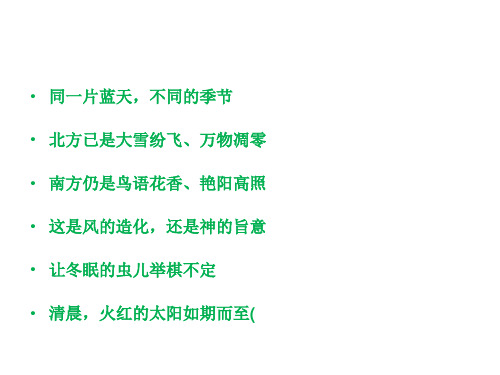
• 小时候 • 乡愁是一枚小小的邮票 • 我在这头 母亲在Байду номын сангаас头 • 长大后 乡愁是一张窄窄的船票 • 我在这头 • 新娘在那头
• 后来啊 • 乡愁是一方矮矮的坟墓 • 我在外头 母亲啊在里头 • 而现在 乡愁是一湾浅浅的海峡 • 我在这头 • 大陆在那头
附
• units1-5必修1 各单元知 识点及课文缩写语法填空
• 12.When _it_ comes to an interview today, • we have many things in mind,such as • being on time and giving proper answers. • 13.The professor could hardly find
• The dark rainy evening the wind th thunder • ing clouds held me _e_n_ti_re_ly(entire)in their • power;It was the first time in a year and a • half ___th_at__I had seen the night face to • face.
八年级上册英语Unit1-5单元知识点归纳
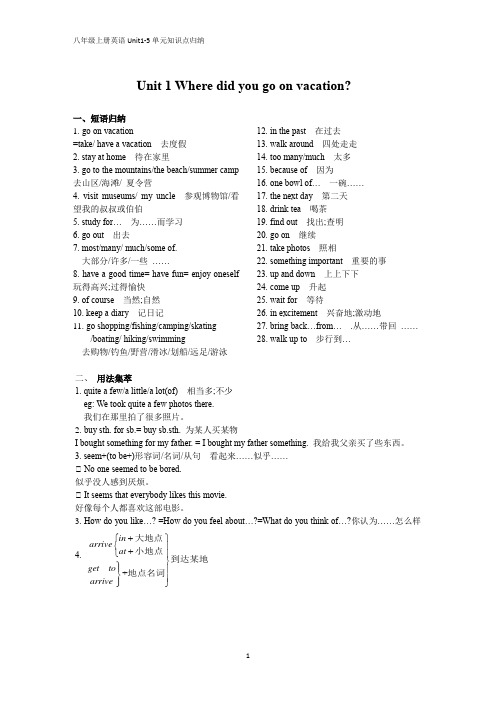
Unit 1 Where did you go on vacation?一、短语归纳1. go on vacation =take/ have a vacation 去度假2. stay at home 待在家里3. go to the mountains/the beach/summer camp 去山区/海滩/ 夏令营4. visit museums/ my uncle 参观博物馆/看望我的叔叔或伯伯5. study for… 为……而学习6. go out 出去7. most/many/ much/some of. 大部分/许多/一些 ……8. have a good time= have fun= enjoy oneself 玩得高兴;过得愉快9. of course 当然;自然 10. keep a diary 记日记 11. go shopping/fishing/camping/skating /boating/ hiking/swimming 去购物/钓鱼/野营/滑冰/划船/远足/游泳12. in the past 在过去13. walk around 四处走走14. too many/much 太多15. because of 因为16. one bowl of… 一碗……17. the next day 第二天18. drink tea 喝茶19. find out 找出;查明20. go on 继续21. take photos 照相22. something important 重要的事23. up and down 上上下下24. come up 升起25. wait for 等待26. in excitement 兴奋地;激动地27. bring back…from… .从……带回 ……28. walk up to 步行到…二、 用法集萃1. quite a few/a little/a lot(of) 相当多;不少eg: We took quite a few photos there.我们在那里拍了很多照片。
八年级英语上册unit1---5知识点
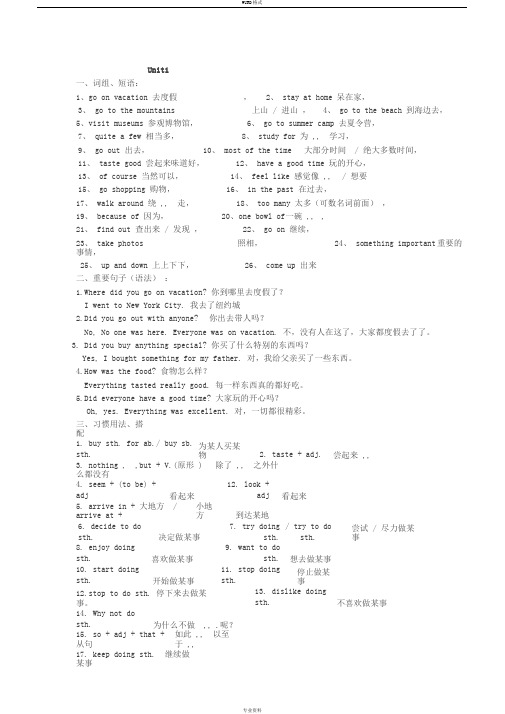
Unit1一、词组、短语:1、go on vacation 去度假,2、 stay at home 呆在家,3、 go to the mountains 上山 / 进山,4、 go to the beach 到海边去,5、visit museums 参观博物馆,6、 go to summer camp 去夏令营,7、 quite a few 相当多,8、 study for 为 ,, 学习,9、 go out 出去,10、 most of the time 大部分时间 / 绝大多数时间,11、 taste good 尝起来味道好,12、 have a good time 玩的开心,13、 of course 当然可以,14、 feel like 感觉像 ,, / 想要15、 go shopping 购物,16、 in the past 在过去,17、 walk around 绕 ,, 走,18、 too many 太多(可数名词前面),19、 because of 因为,20、one bowl of 一碗 ,, ,21、 find out 查出来 / 发现,22、 go on 继续,23、 take photos 照相,24、 something important 重要的事情,25、 up and down 上上下下,26、 come up 出来二、重要句子(语法):1.Where did you go on vacation? 你到哪里去度假了?I went to New York City. 我去了纽约城2.Did you go out with anyone? 你出去带人吗?No, No one was here. Everyone was on vacation. 不,没有人在这了,大家都度假去了了。
3. Did you buy anything special? 你买了什么特别的东西吗?Yes, I bought something for my father. 对,我给父亲买了一些东西。
人教版九年级上册英语unit1-5知识点

人教版九年级上册英语unit1-5知识点Unit 1: Getting to Know Each OtherIn the first unit of the ninth-grade English textbook, we delve into the theme of getting to know each other. This unit not only helps students build connections with their classmates but also teaches them valuable language skills. Let's explore some key knowledge points covered in this unit.Firstly, students learn about personal introductions. They are introduced to phrases such as "Nice to meet you," "What's your name?" and "Where are you from?" These phrases enable students to introduce themselves confidently and initiate conversations with their peers in English.Next, they familiarize themselves with greetings and goodbyes. This not only includes common expressions like "Hello," "Good morning," and "Goodbye," but also more informal phrases like "What's up?" and "See you later." Understanding these greetings and goodbyes allows students to engage in simple conversations and express their friendliness.Additionally, this unit focuses on asking and answering simple questions. Students learn how to inquire about someone's age, birthday, phone number, and hobbies. They also practice answering these questions using appropriate language structures. This develops their conversational skills and encourages interactive practice in English.Moreover, students learn about describing people's appearance and personalities. They get introduced to vocabulary related to physical appearance, such as hair color, eye color, height, and weight. They also learn adjectives to describe one's character traits, such as friendly, outgoing, and diligent. This vocabulary enables students to express themselves more accurately and create stronger connections with others.Unit 2: My School LifeMoving on to the second unit, we dive into the topic of school life. This unit focuses on familiarizing students with school-related vocabulary, daily routines, and expressing personal opinions. Let's explore some of the key knowledge points covered in this unit.To begin, students learn words related to the school environment, such as classroom, library, laboratory, and playground. They also learn vocabulary associated with subjects like math, science, English, andhistory. Understanding these words allows students to navigate their school environment and talk about their favorite subjects.The unit then introduces phrases and expressions related to daily routines. This includes discussing activities like waking up, eating breakfast, going to school, attending classes, and doing homework. Students also learn adverbs of frequency like "often," "sometimes," and "never" to describe the frequency of their daily activities. This vocabulary helps students express their routines and compare them with their classmates.Furthermore, students are encouraged to express their opinions about school life. They learn language structures like "I like/don't like," "I love/hate," and "I prefer..." to talk about their preferences regarding subjects, teachers, and school activities. This allows them to engage in discussions and express their perspectives confidently.Unit 3: My Free TimeIn the third unit, students explore the theme of free time activities. This unit focuses on expanding their vocabulary related to hobbies, discussing leisure activities, and expressing preferences. Let's delve into the key knowledge points covered in this unit.Firstly, students learn vocabulary related to popular hobbies and leisure activities. This includes words like reading, playing sports, dancing, painting, and playing musical instruments. Understanding these words enables students to describe their hobbies accurately and engage in conversations about leisure activities.Next, students practice discussing their free time activities using appropriate language structures. They learn how to express their preferences, such as "I enjoy playing basketball," "I prefer watching movies," and "I don't mind swimming." This helps students express their likes and dislikes with confidence and engage in conversations about their interests.Additionally, this unit explores the concept of time phrases and adverbs related to free time activities. Students learn words like "every day," "sometimes," "often," and "never" to describe the frequency of their hobbies. This vocabulary allows them to discuss how often they engage in specific activities and compare their routines with others.Unit 4: Our School RulesThe fourth unit delves into the topic of school rules and regulations. This unit not only teaches students about the importance of following rules but also encourages them to express their opinions on different rules. Let's explore the key knowledge points covered in this unit.Firstly, students learn vocabulary related to school rules, such as "no running," "no littering," and "respect others." They understand the importance of following these rules to maintain a conducive learning environment and promote a sense of discipline among students.Next, they practice using language structures to express their opinions on different rules. Students learn phrases like "I think," "I believe," and "In my opinion" to construct sentences expressing their thoughts. This fosters critical thinking skills and encourages students to evaluate rules based on their merits.Additionally, this unit introduces students to the concept of consequences for breaking school rules. Students learn phrases like "get a warning," "detention," and "suspend from school." They understand that actions have consequences and the importance of adhering to rules to avoid disciplinary actions.Lastly, this unit encourages students to propose new school rules or modifications to existing ones. They learn how to use language structures like "I suggest," "We should," and "It would be better if" to express their ideas. This fosters creativity and allows students to engage in discussions about school rules constructively.Unit 5: A Trip to A Famous Historical SiteThe fifth and final unit of the ninth-grade English textbook focuses on historical sites and cultural heritage. This unit not only explores famous landmarks but also teaches students about the importance of preserving historical sites. Let's explore the key knowledge points covered in this unit.Firstly, students learn vocabulary related to famous historical sites around the world, such as the Great Wall of China, the Pyramids of Egypt, and the Colosseum in Rome. They understand the significance of these landmarks and the cultural heritage associated with them.Next, they explore the concept of cultural preservation. Students learn about the importance of preserving historical sites for future generations. They discuss the benefits of cultural preservation andbrainstorm ideas on how to protect these landmarks from destruction and decay.Furthermore, this unit focuses on developing students' descriptive writing skills. They practice using appropriate adjectives and adverbs to describe historical sites vividly. This helps students develop their language skills and write engaging descriptions of famous landmarks.Lastly, this unit encourages students to plan a trip to a historical site. They learn how to discuss transportation, accommodation, and itinerary using appropriate language structures. This activity fosters critical thinking, planning skills, and encourages students to explore various destinations worldwide.ConclusionThe first five units of the ninth-grade English textbook provide students with a comprehensive foundation in language skills and cultural knowledge. From facilitating introductions and fostering connections to exploring school life, hobbies, school rules, and historical sites, these units cover a wide range of topics. By understanding and applying the knowledge points covered in these units, students can communicate effectively in English, express theirthoughts and preferences confidently, and engage in discussions about various aspects of life.。
人教版七年级上册英语 Unit 1 - Unit 5 知识点总结

人教版七年级上册英语Unit 1 - Unit 5 知识点总结Unit 1 My name ’s Gina知识点总结一、重点短语、句型1. -What ’s your name?- My name's Gina. = I ’m Gina.你的名字是什么?我的名字是吉娜。
我是吉娜。
2.-What ’s his/her name?- His /Her name ’s Tom/ Gina.=He’s /She’s Tom/ Gina.他/她的名字是什么?他/她的名字是汤姆/吉娜。
他/她叫汤姆/吉娜。
3.- Is she Mary? –Yes, she is./ No, she isn ’t.她是玛丽吗?是的,她是。
不,她不是。
4.-Are you Helen? –Yes, I am 。
/ No, I ’m not.你是海伦吗?是的,我是。
不,我不是。
5. A: What's your telephone number?B: My phone number is 281-9176.It's 281-9176.你的电话号码是多少?我的电话号码是281-9176 。
6. -Nice to meet/see you. -Nice to meet/see you, too. 见到你很高兴。
见到你也很高兴 .st name=family name=last name 姓氏8.first name = given name 名字9.telephone number=phone number 电话号码二、交际用语(一)常见的问候表达方式有:1、Hello/Hi2、Good morning/afternoon/evening/night3、Nice to meet you/Nice to meet you, too4、How are you?5、How do you do?(二)常见的介绍表达方式有:1. I ’ m… /My name ’ s… /This is … /These are … and….2. Nice to meet you.3. What ’ s your phone number?4. It ’ s 2842942.三、语法1、be 的一般现在时形式2、What 引导的特殊疑问句3、形容词性物主代词:my ,your,his,her四、知识点1.My name ’ s Jenny.我的名字叫詹尼。
八上英语unit1-unit5知识点总结
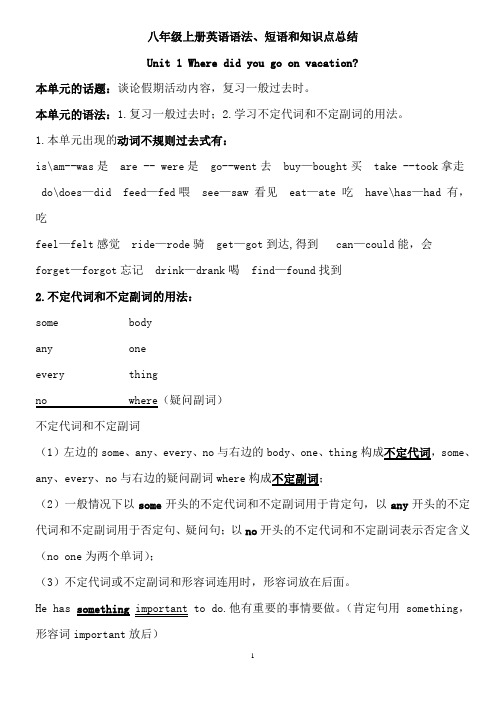
八年级上册英语语法、短语和知识点总结Unit 1 Where did you go on vacation?本单元的话题:谈论假期活动内容,复习一般过去时。
本单元的语法:1.复习一般过去时;2.学习不定代词和不定副词的用法。
1.本单元出现的动词不规则过去式有:is\am--was是 are -- were是 go--went去 buy—bought买 take --took拿走 do\does—did feed—fed喂 see—saw 看见 eat—ate 吃 have\has—had 有,吃feel—felt感觉 ride—rode骑 get—got到达,得到 can—could能,会forget—forgot忘记 drink—drank喝 find—found找到2.不定代词和不定副词的用法:some bodyany oneevery thingno where(疑问副词)不定代词和不定副词(1)左边的some、any、every、no与右边的body、one、thing构成不定代词,some、any、every、no与右边的疑问副词where构成不定副词;(2)一般情况下以some开头的不定代词和不定副词用于肯定句,以any开头的不定代词和不定副词用于否定句、疑问句;以no开头的不定代词和不定副词表示否定含义(no one为两个单词);(3)不定代词或不定副词和形容词连用时,形容词放在后面。
He has something important to do.他有重要的事情要做。
(肯定句用something,形容词important放后)Did you buy anything special? (一般疑问句用anything,形容词special放后)Did you go anywhere interesting last month?上个月你去令人感兴趣的地方了吗?(一般疑问句用不定副词anywhere,形容词interesting放后)(4)不定代词和不定副词做主语时,后面的动词用单数形式。
人教版八年级下册Unit1-5 (期中)知识点归纳与总结

已排版好可直接打印使用巧思妙解提升思维能力Unit1-5知识点归纳与总结Unit1Where did you go on vacation?一、重点单词复合不定代词:(anyone,anywhere,something,nothing,everyone,someone);wonder,wonderful;反身代词:(myself;yourself);few;most;bored;decide;try;difference;enough;below,umbrella二、重点短语1.go on vacation去度假2.too many太多(后跟可数名词复数)3.quite a few相当多4.study for a test为考试学习5.taste good尝起来味道好6.have a good time=have fun玩得开心7.of course当然可以8.feel like感觉像……/想要9.something important重要的事情10.because of因为(+名词,代词或名词性词)11.most of the time大多数时间12.arrive in到达13.Long time no see好久不见14.keep a diary写日记15.go to the mountains去爬山16.go to the beach到海边去17.visit the museums参观博物馆18.go to summer camp去夏令营19.go out出去20.go shopping购物21.in the past在过去22.walk around四处走走23.one bowl of rice一碗米饭24.find out查出来/发现25.go on继续26.stay at home呆在家27.take photos照相28.up and down上上下下e up升起,出来三、习惯用法、搭配1.buy sth.for sb./buy sb.sth.为某人买某物(sb.某人;sth.某物)★2.taste+adj.尝起来……(adj.形容词)3.arrive in+大地方/arrive at+小地方到达某地★4.decide to do sth.决定做某事(to do表示动词不定式,就是在动词原形前加to)★5.try doing sth.尝试做某事/try to do sth.尽力做某事6.enjoy doing sth.喜欢做某事7.want to do sth.想去做某事8.start doing sth.=start to do sth开始做某事9.stop doing sth.停止做某事10.look+adj看起来11.dislike doing sth.不喜欢做某事12.Why not do sth.?=Why don’t you do sth?为什么不做…….呢?13.so+adj+that+从句如此……以至于……★14.tell sb.(not)to do sth.告诉某人(不要)做某事15.keep doing sth.继续/不停做某事16.★16.forget to do sth.忘记去做某事/forget doing sth忘记做过某事四、重点句子--Where did you go on vacation?你到哪里去度假了?---I went to New York City.我去了纽约城--Did you go out with anyone?你和他人出去的吗?--No,No one was here.Everyone was on vacation.不,没有人在这儿。
小学英语外研版六年级下册期中知识点梳理(Unit 1-5)

六年级英语下册知识点Module 1【词汇】look看上去 cashier收银员 cola可乐 dollar美元 cent美分 enjoy享用,享受careful小心的 Be careful! 当心!【句子】1.I want to a hot dog, please.我想要一个热狗,谢谢。
2.— How much is it? 它多少钱?— It’s thirteen dollars and twenty-five cents.是十三美元二十五美分。
3.Enjoy your meal! 好好享受你的美食吧!4.It looks good! 它看上去不错!5.Can I help you? 我能为你做点什么?6.Here you are.给你。
7.— What do you want to eat? 你想要吃什么?— I want a hamburger.我想要一个汉堡包。
8.— What do you want to drink? 你想要喝什么?— Milk, please.牛奶,谢谢。
【句型结构】①询问你想要吃什么— What do you want to eat?— I want + 食物./ I want to eat ...eg: — What do you want to eat? 你想要吃什么?— I want to eat noodles and beef.我想吃面条和牛肉。
②询问你想要喝什么— What do you want to drink?— I want + 其他./ I want to drink...eg: — What do you want to drink? 你想要喝什么?— I want to drink juice.我想和果汁。
③询问价格How much is it? / How much are they?eg: — How much is this book? 这本书多少钱?— It’s fifteen yuan.十五元。
Unit1-Unit5一轮复习重点词汇短语清单高考英语人教版选择性

13.be based on以……为基础
14.form a habit of养成……的习惯
Unit3 Environmental Protection
重点单词词性转换
1.starve vi.&vt. (使)挨饿;饿死→starvation n.饿死;挨饿;绝食
7.decency n.正派;规矩;礼貌→decent adj.相当不错的;正派的;得体的→decently adv.合适地;高雅地;正派地
8.persevere vi.坚持;孜孜以求→perseverance n.毅力;韧性;不屈不挠的精神
9.resolve vi.& vt.决定;决心;解决(问题或困难)n.决心;坚定的信念→resolution n.决议;解决;坚定
11.invest v.投资;投入→investment n.投资额;投资;(时间、精力的)投入
12.memorial n.纪念碑(或像等);纪念物;纪念品adj.纪念的;悼念的→memory n.记忆力;记性
13.represent v.代表→representative adj.典型的;有代表性的n.代表
2.correspond vi.相一致;符合;相当于;通信→correspondence n.来往信件;通信联系→corresponding adj.符合的;相同的;一致的;对应的
3.respective adj.分别的;各自的→respectively adv.分别;各自;依次为
4.rhythm n.节奏;韵律;规律→rhyme n.押韵词;押韵的短诗vi.& vt. (使)押韵→rhymer n.作诗者;打油诗人→rhyming adj.押韵的n.押韵
- 1、下载文档前请自行甄别文档内容的完整性,平台不提供额外的编辑、内容补充、找答案等附加服务。
- 2、"仅部分预览"的文档,不可在线预览部分如存在完整性等问题,可反馈申请退款(可完整预览的文档不适用该条件!)。
- 3、如文档侵犯您的权益,请联系客服反馈,我们会尽快为您处理(人工客服工作时间:9:00-18:30)。
• 周末你通常做什么? • 周末她通常做什么? • 大多数学生每周至少使用互联网 两次 • 下周我很忙 • 他多久看一次电视?--他几乎从 不看电视 • 她有时候去购物
• 1. 帮忙做家务 • 2.一周一次 • 3. 一月两次 • 4.下周我很忙 • 5. 你正在学习哪种舞蹈? • 6. be good for/ at/ with • 7. perent of 的用法 • 8. not …at all 根本不…
写出比较级 1.tall 2. thin 3. long 4. quiet 5. quietly 6. loud 7. loudly 8. short 9. heavy 10. outgoing 11.friendly 12. hard-working 13. smart 14. lazy 15. fast 16. high 17. hard 18. early 19. serious 20. funny 21. popular 22. shy
你喜欢昨天的唱歌比赛吗? 哪一个是Lisa? 最重要的是学习新东西。 莉莉比露丝聪明吗? 莉莉比露丝更外向吗? 你和你姐姐一样友好吗? 汤姆和吉姆一样努力吗? 汤姆和吉姆跑得一样快吗? 朱迪和你一样高吗?
• • • • • • • • •
好朋友喜欢和我做一样的事 好朋友会让我笑 妈妈告诉我好朋友像一面镜子 我比大多数小孩要更安静和更严肃 那就是我为什么喜欢读书的原因 对我来说交朋友不太容易 朋友像书—你不需要很多,只要他们够好 我最好的朋友和我完全不一样 我好朋友Larry经常会帮我把我最好的一面 展现出来
1.Tara 和Tina 工作一样努力 2. Tara 和Tina 一样有趣 3. Tara比Tinag 更外向 4 .Lily比Lucy弹钢琴更好 5. Lily比Lucy跳得更高 6. Lucy起床比Lily更早 7. 我比两年前更外向了 8. Ann 比Kim 更友好
• • • • • • • • •
Unit1
• What about/ how about +ing • Why not +动词原形 • 待在家里、去夏令营、去海边、 • 大部分时间 • 好久不见 • 照了很多照片 • 似乎是 seem to be
1. 我想知道过去这里的生活是什么 样的? 2. enough的用法 3. 我感觉我像只小鸟 4. enjoy/like/lovபைடு நூலகம்+ 5. because/because of的区别 6. 记日记 7. 不定代词做主语,谓语用… 8. 不定代词与形容词位置关系
• 最好的电影院怎么去? • 镇上最好的衣服店是哪个? • 镇上最差的衣服店是哪个? • 它离我家最近 • 你能最快地买票 • 它有最差的服务
• Thanks for+动词ing • How far is it from your home?— 10minutes by bus. • 各种各样的 • 越来越:1)bigger and bigger 2) more and more popular 3) the +比较级,the +比较级 由某人决定做某事 play a role in+动词ing
1.你想看新闻吗? 2.你今晚打算看什么? 3.你期望从情景喜剧中学到什么? 4.你为什么喜欢看新闻? 5.你认为脱口秀怎么样啊? ------我无法忍受它们。 6. 我想弄清世界各地正在发生着什么
1. think of 认为 2. be famous for/ as 3. appear 出现 不及物动词 Mickey’s first cartoon appeared in 1987 4. may // might 后面跟动词原形 5. one of the main reasons is that… 6. face the dangers 面对危机 7. hope/expect区别 8.从…中学习 9. stand/mind 后面接动词ing
• 做某事的方法 • Be talented in+动词ing • 寻找 • 查明弄清 • 等等: and so on
Unit5
1.情景喜剧 2.新闻 3.肥皂剧 4.有教 育意义的 5.计划 6. 希望 7.查明弄 清 8.讨论 9.忍受 10.发生 12.预料 13. 玩笑 14. 喜剧 15. 毫无意义的 17.动作片18.卡通片19.文化20.出名 的21.出现22.变成23.富有的24.成功 的26.主要的27.原因28.普通的29.电 影30.不幸运的31.失去32.愿意迅速 做某事33. 角色34.简单的36.代替某 人的位子37. 陆军 38.干得好
• Larry 远不如我那么勤奋 • 露丝远远不如我那么外向 • 我不在乎我的朋友是否跟我一样或 者不同 • 我们可以谈论及分享任何事情 • 她和孩子们相处得很好 • 我在英语上获得了很好的成绩
1. both的用法 be动词后,实义动词前 We are both students/ We both like English. 2. 反意疑问句回答:根据事实说话、 不管中文意思 3. 最重要的事是学习新东西和开心 4. 某方面有才能: 5. 让某人做某事:make sb do sth 6. 修饰比较级的有: 7. 获得好成绩:
7. try one’s best to do sth 尽某人最大的努力 8. not so… as… 不及… 9. a symbol of …的标志 10. be ready to…愿意迅速做某事 11. dress up装扮//make up编造//make sb up给 某人化妆 12. take one’s place代替某人位子 13. do a good job 干得好
• 你假期去哪里了? • 你和某人一起出去的吗? • 你买了一些特别的东西么? • 食物怎样?一切尝起来不错 • 每个人都玩得开心吗?
Unit2
• 1.家务事 2.节目 3.忙的 4.可能 5.至少 • 6.垃圾食品 7.健康 8.结果 9.百分比 10.在 线 • 11.尽管 12.凭借/穿过 13.例如 14.在一起 • 15.牙医 16.消失 17.杂志 18.然而 19.多于 20.少于21.得分 22.多久一次 23.使用互 联网 24.一周一次25.一月两次 26.健康的 早餐 27.去看电影 28.对…有好处 29.空闲 时间 30.饮食习惯 31.几乎从不 32.消遣
1. 某人 2.任何人 3. 每人 4.无人 5. 某事 6. 任何事 7. 每件事 8. 无物 9. 似乎是 10. 精彩的 11. 相当多 12. 厌倦的 13. 感觉像 14. 决定做某事 15. 不喜欢 16. 商人 17. 活动 18. 想知道 19. 记日记 20.任何地方 21.饥饿的 22. 足够的食物 23.足够好24. 如同 25.差别 26. 等待某人/物 27. 在..下面28.建筑物 29.雨伞 30.尝试做某事 31.尽力做某事 32.湿的
•Unit3
1.友好的 2. 较好的 3. 大声地 4. 轻声地 5. 努力的 6. 比赛 7.哪一个 8.清楚地 9. 获胜 10. 有才能的 11.真正;确实 12. 严肃的 13. 必要的 14.关心 15. 虽然 16. 伸手 17. 破裂;损坏 18.分享 19.死 20. 相像 21. 触 碰;感动 22.发笑 23. 响亮的 24.信息 25. 极好的 26. 两个都 27.小孩 28. 成绩 29. 应 该 30.谚语 31.内心 32. 使显现 33. 与…不 同 34. 与…一样 35. 与…相似 36.关心;在意 37.只要 38.事实上
• although/ though的区别 • 告诉某人某事、告诉某人做某事 • It is + adj +(for sb) to do sth • 感动内心 • 感觉更好 • 和…不同/ 和…相似/ 和…相同 • 只要 • 伸手
• 那就是…的原因 • 和某人分享某东西 • 是否/如果 • 像/看起来像 • 把某人最好的一面展现出来 • 谚语 • 损坏某物
Unit4
• 1. 舒服的 2. 舒服地 3. 便宜的 4. 便宜地 5. 票 6. 更坏的 7. 最坏 的 8. 细心的9.细心地选择 10. 新鲜的11. 到目前为止 12. 服务 13. 有创造力的14. 有相同特征 15. 各种类型的16. 发挥作用17. 发挥重要的作用18.编造19. 装 扮 20. 例如 21.认真对待22. 给 某人某物23. 拥挤的
